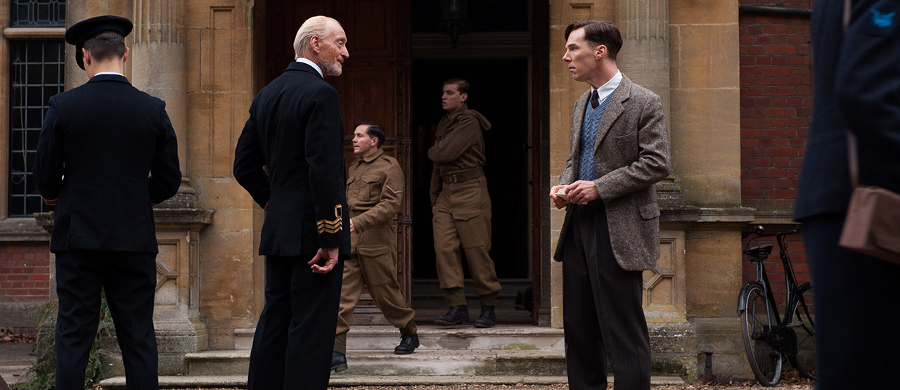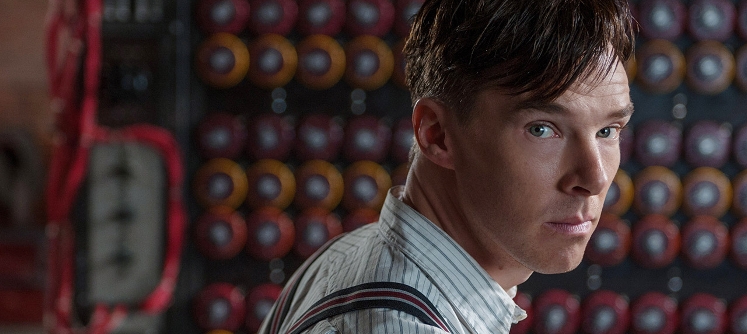Benedict Cumberbatch delivers a moving homage to one of history’s unsung heroes.
On the surface, The Imitation Game is a period drama set during World War II, but instead of Allies and Nazis blasting away at each other, this film tells the true story of the intelligence war happening behind closed doors on the home front. More specifically, through an engrossing and intimate character study of the man who helped ensure the Allies’ victory without the public ever knowing he was there.
Cumberbatch plays Alan Turing, a brilliant but socially difficult mathematician who is hired by the British Intelligence Service to help crack an “unbreakable” encryption device (the Enigma code) that conceals vital German communications. Turing is presented as being as obnoxious as he is earnest, setting him at odds with his superior commander and his cohorts. It brings to mind Russell Crowe’s performance in A Beautiful Mind and is just as nicely executed.
The Enigma
Loosely based on the biography Alan Turing: The Enigma by Andrew Hodges, The Imitation Game brilliantly captures a sense of duality that amps up the tension throughout its two-hour runtime. We only see snippets of the ever-encroaching German march towards Britain’s doorstep. Meanwhile, a small group of men sit in a basement room at a secret countryside estate attempting to bring an end to the war by creating something no-one thought possible.
The film also showcases Turing’s struggle with being a homosexual man in a difficult era. Luckily, his search for acceptance never comes across as heavy-handed or overbearing. He also develops a relationship with co-worker Joan Clark (Keira Knightley) in an attempt to appear normal, but quickly discovers that it’s because of his perceived abnormality that he is able to achieve something remarkable.

The soundtrack is evocative without being intrusive, leaving the bulk of the emotion to come from the actors’ performances. Amongst all the tightrope-walking drama, there is also a good dose of humour, much of which stems from Turing’s failed attempts at human contact. He finds resolution to these failures in his platonic relationship with Joan. Keira Knightley’s character provides a beacon of light in which Turing finds solace, even love, despite his sexual orientation, which will later come back to haunt him.
Historical thrills
Everything about this production is wonderfully British, but never comes across as patriotic, and the countryside setting is the most unassuming location for the massive task at hand! The story is also genuinely inspiring and even poignant at times. Mostly created by the difficult moral choices facing Turing’s team as they come to realise their code-breaking secret must be protected at all costs – constantly raising the emotional stakes.
Although the film occasionally becomes a little bit cliché, it’s always grounded by the dissection of Turing’s personal life and the pressures bearing down on him. It’s rare for a film to come along that makes you feel every emotional beat without beating you in the face with it. Cumberbatch’s terrific performance and meaningful supporting cast makes the interweaving conflicts come alive.
The film’s timeline is also stitched together with finesse and the total effect is far greater than the sum of the parts, a feat that can be said for the film as a whole. Seeing snippets of Turing’s childhood adds significant context to his motivations during the war and the timeline also jumps forward to the post-war era in which Turing is being prosecuted for soliciting homosexual relations.
After the credits roll, there is the inescapable feeling that Alan Turing must have been a vastly underrated hero and that he deserved far better, even as he  sacrificed his own health to continue his significant work after the war.
sacrificed his own health to continue his significant work after the war.
Overall, the inspirational tone makes this superb viewing for the family, whilst the critique of anti-gay laws and attitudes marks it with a maturity that gives it a confident voice in the sea of period-drama dross.
The Imitation Game will be released on DVD and Blu-ray on 9th March 2015.




























